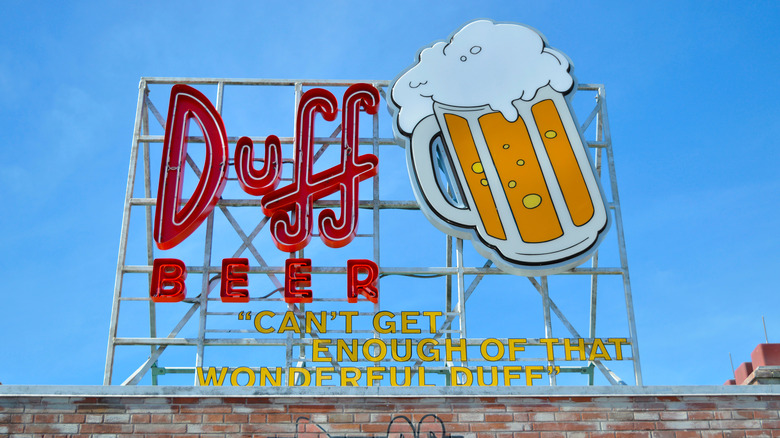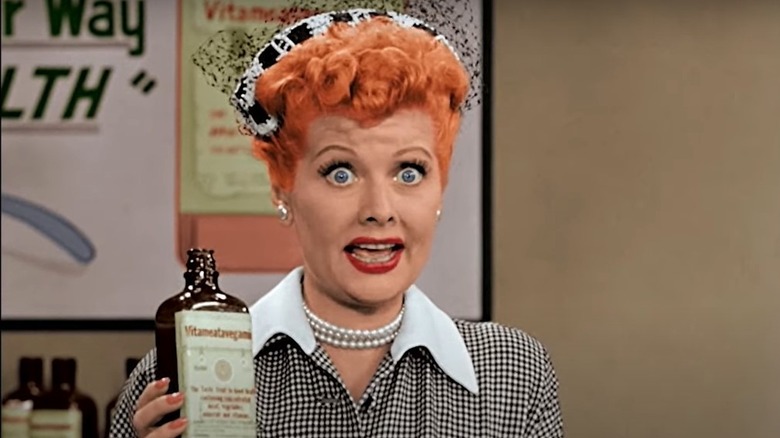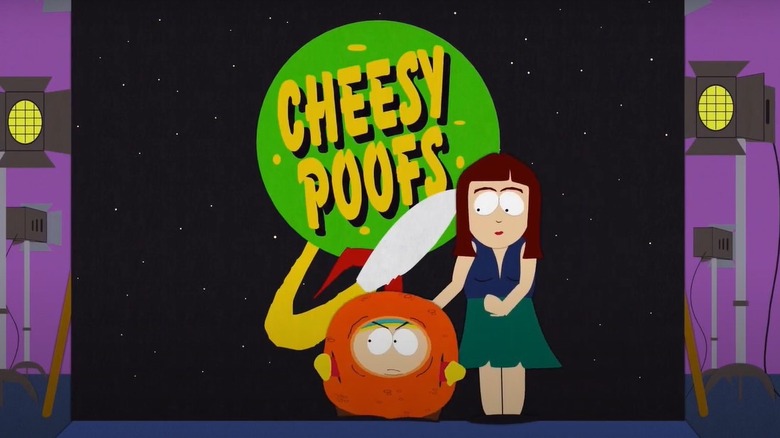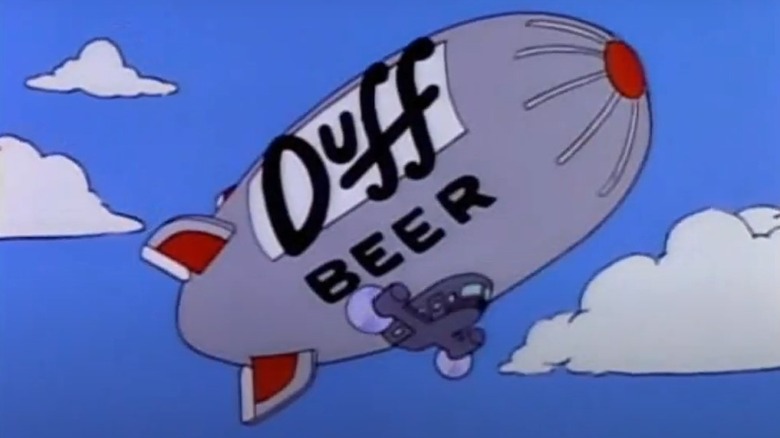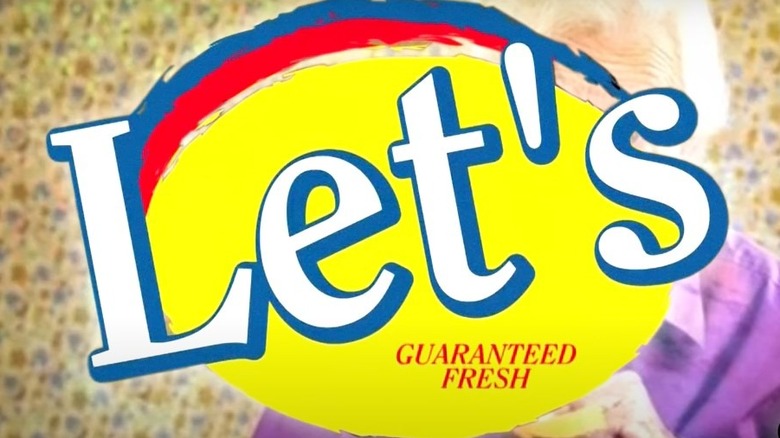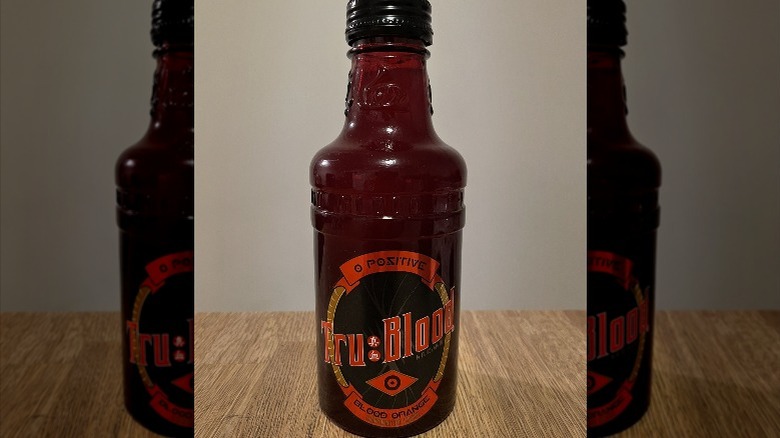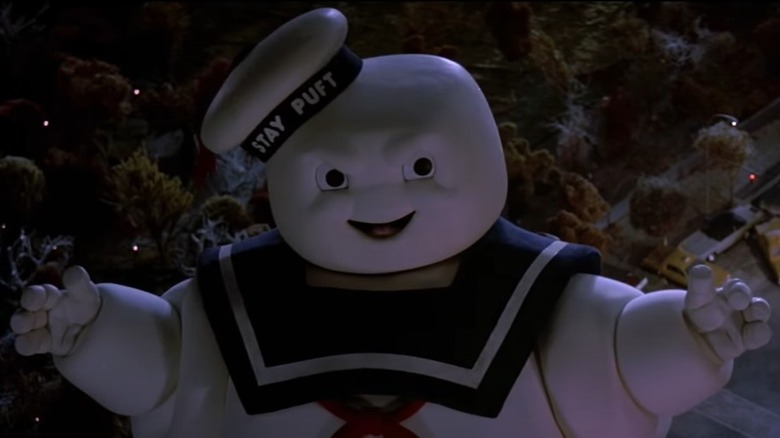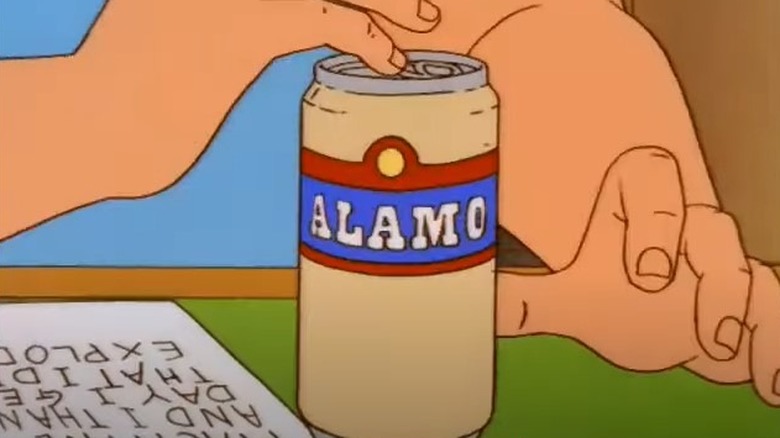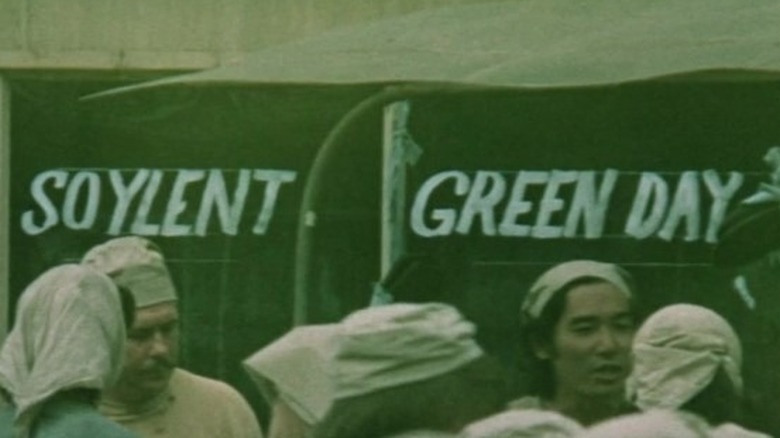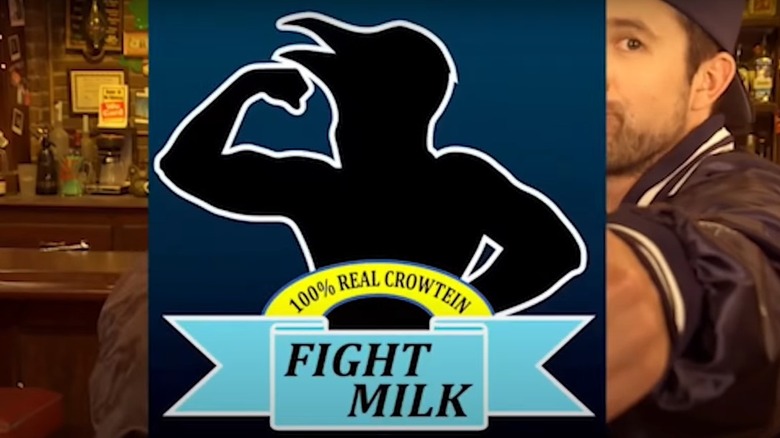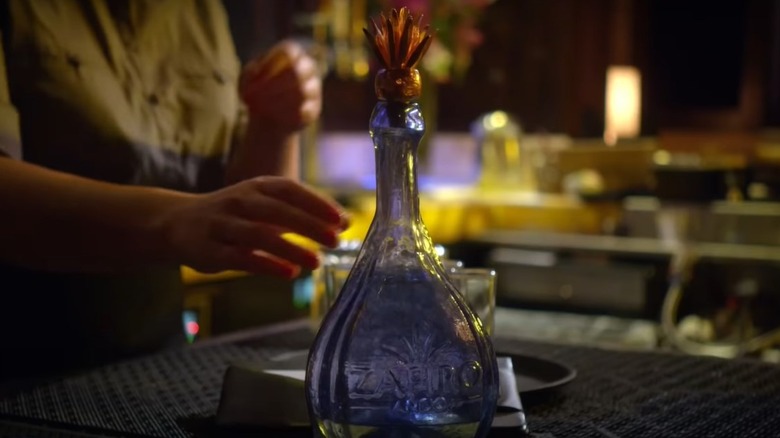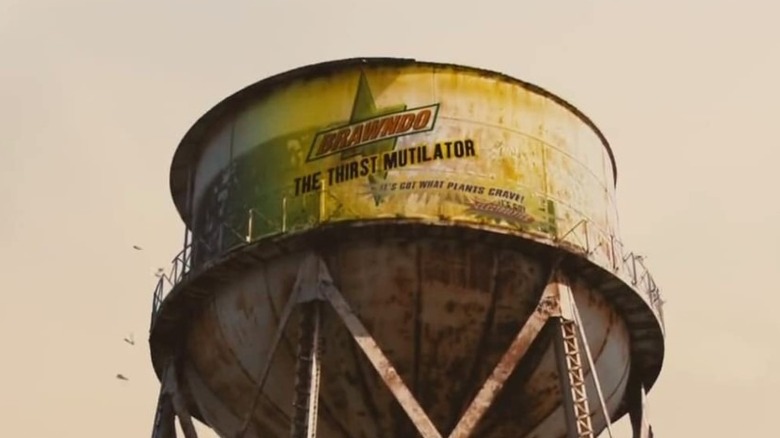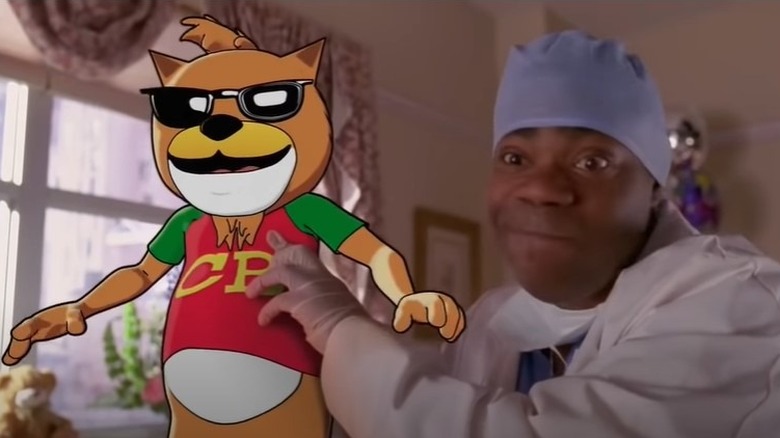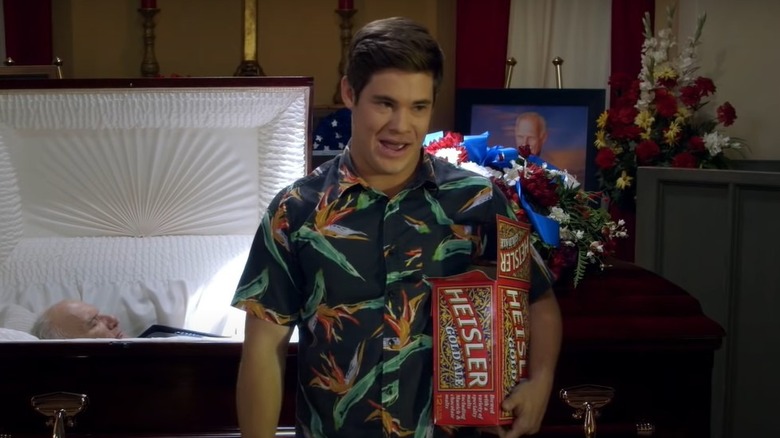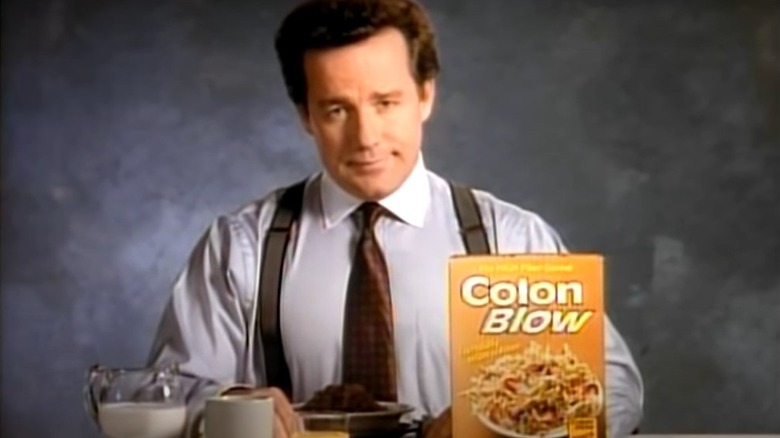Most Iconic Fictional Food Brands Of All Time
Whether it's an attempt to avoid copyright infringement and royalty payments, or a chance for clever writers to poke fun at an existing brand with impunity, the use of fake brands in fictional works has been a popular practice for decades. The enduring iconography of some fictional food brands is hard to deny. After all, who among us hasn't finished an episode of "The Simpsons" and found themselves craving an ice cold Duff beer? Haven't many of us longed for a snack to munch on while watching "South Park" and lamented the inability to grab a bag of Cheesy Poofs like Cartman, Stan, Kyle, and Kenny would?
While fictional food and drink brands are nothing new, the select few that have lingered in the public's consciousness have done so for a reason. It's not a stretch to say certain fictional food and drink brands have transcended their original introduction to become, in some cases, nearly as iconic as the show or film that birthed them. With that in mind, let's explore the history of fake brands in film and television and dig into some of the most iconic fictional food brands of all time.
Vitameatavegamin (I Love Lucy)
It's not exactly shocking to say Lucille Ball may have invented the notion of fictional food brands — after all, she's responsible for just about everything related to modern situational comedy. The star of "I Love Lucy" was known as much for her genius as her relentlessly silly antics, and few things from her star-making series have stuck in viewers' minds quite like the fictional brand, Vitameatavegamin, which Lucy hawks during the Season 1 episode, "Lucy Does a TV Commercial."
Acting as a spokesperson for the so-called health elixir, Vitameatavegamin — with a slogan boldly declaring that you can "spoon your way to health" — Lucy insists on drinking the real product while filming. Of course, since the fictional beverage contains 23% alcohol (via Orlando Sentinel), the red-haired protagonist ends up getting progressively sloshed throughout the scene. As a trailblazer for physical comedy, Ball nails the obliviously drunk mannerisms of her character, flubbing lines and giggling uncontrollably as the liquor takes hold.
The enduring popularity of Vitameatavegamin is apparent nearly three-quarters of a century after its first appearance. In fact, it remains an immensely beloved fictional brand for fans, given that there are more than 50 pieces of Vitameatavegamin merchandise available at The Lucy Store as of July 2022.
Cheesy Poofs (South Park)
We tend to take anything said by Trey Parker and Matt Stone, the creators of "South Park," as the gospel truth. So when early episodes featured a commercial and jingle declaring any person who didn't eat the fictional food brand, Cheesy Poofs, to be "lame," who were we to argue?
Just about every character in the fictional town of South Park, Colorado wanted Cheesy Poofs. Though the series hasn't featured the fictional snack brand as prominently since Cartman sang the theme song in Season 2, Episode 11, it still pops up here and there within the series.
Since few corporate entities can pass up the chance to take on synergistic marketing campaigns — that is, an opportunity to make money — Comedy Central and Frito Lay teamed up in 2011 to produce a real version of the once-fictional Cheesy Poofs (via TODAY). In honor of the show's 15th season, 1.5-million bags of Cheesy Poofs were made available for a limited time at Walmart, boosting the iconic credentials of this fictional food brand.
Duff Beer (The Simpsons)
Few fictional food brands can match the iconic status of Homer Simpson's favorite all-American beer, Duff (not Fudd, like those Shelbyville jerks prefer). Can any fictional food brand even hold a candle to this beer seen on a brewery tour, in an amusement park sponsor, and with a sporting event sky presence akin to the Goodyear Blimp?
Perhaps the almost-inconceivable pop cultural impact of "The Simpsons" during its first decade on television played a hand in Duff beer becoming such a well-known fictional product. Of course, though the show's popularity has diminished (in a way that was likely unavoidable after more than 30 seasons on air), it's still hard to deny Duff beer's standing in fans' minds.
After all, plans to produce a real life version of the fictional beer were introduced in 2015 (via Rolling Stone). And, as of 2022, guests of Universal Studios Orlando can enjoy a Duff beer at an actual Duff Brewery, which features a Duff Man figure to take pictures with, as well as all the ambiance expected from the maker of Springfield's finest lager.
Let's potato chips (Community, Orange is the New Black)
It may come as a surprise, but not all iconic fictional food brands have earned that distinction because of a single series. In an industry where every penny counts, it makes all the sense in the world that some generic brands have been featured on multiple shows — like the widely-used fictional potato chip brand, Let's.
Let's potato chips have been seen in numerous series, including "Orange is the New Black," "Arrested Development," and "My Name is Earl" (via BuzzFeed). Of course, no show integrated the fake chips into its scenery better than the cult classic, "Community." Though the hyper-meta series about a group of community college misfits didn't quite reach its oft-stated six seasons and a movie benchmark, it did feature a bizarre Let's commercial. Additionally, it aired an episode tag where elderly student, Leonard (Richard Erdman), reviews the brand for a YouTube-like show.
Additionally, the gigantic prop bags of Let's, with a logo closely resembling that of Lay's potato chips, have been seen in a variety of different flavors, according to Potato Chip World. This helped lend the fictional brand an air of verisimilitude, ensuring it embedded itself in our cultural mind as a fictional food brand we can't forget.
Tru Blood (True Blood)
Not all fictional food brands become iconic because fans were eager to consume a realistic version of the product. At least, we hope not. Frankly, if even one of the many "True Blood" fans was interested in the show's version of its not-quite-titular drink, Tru Blood — a synthetic version of human blood – well, we wouldn't want to meet them.
The gory, sensual "True Blood" was hugely popular in its day. Revolving around the on-again, off-again romance between human Sookie Stackhouse (Anna Paquin), and syntax-impaired vampire Bill Compton (Stephen Moyer), the show's blood-substitute beverage played a big part in the plot. Tru Blood allowed vampires to "come out of the coffin," as the characters called it. A Season 6 teaser featured nothing more than a Tru Blood bottle and in 2022, several items of "Tru Blood" merchandise remained for sale on the HBO website.
The hullabaloo surrounding the show even led to the 2009 release of a real-life version of Tru Blood (via Food Processing). The blood orange-flavored carbonated beverage was a fun way for fans to dip their toe in the show's world, providing an additional way to cosplay along at home with Eric (Alexander Skaarsgard), Pam (Kristin Bauer van Straten), and the rest of the Fangtasia gang.
Stay Puft marshmallows (Ghostbusters)
We don't have nearly as much control of what we consciously think, according to a 2018 study published in the journal Frontiers in Psychology. So while his fellow Ghostbusters may have felt the urge to blame Ray Stantz (Dan Aykroyd) for being unable to keep his mind blank during the climax of 1984's "Ghostbusters", well ... we can understand why the Stay Puft marshmallow man made an appearance anyway.
It's easy to see why the "Ghostbusters" films' signature monster — the mascot of a once-fictional marshmallow brand, Stay Puft (which has since been turned into a real thing by Campfire Marshmallows) — remained etched in the character's mind. It's the same reason Stay Puft has lingered in the public's imagination since its mascot stomped around Manhattan nearly 40 years ago. It's an awesome image, from the monster itself to the marshmallow crème raining down after its destruction.
So, don't blame Ray for the Stay Puft marshmallow man's appearance. If anything, let's all celebrate the man whose wandering thoughts brought one of the most iconic fictional brands into existence.
Alamo Beer (King of the Hill)
Hank Hill (Mike Judge) was a simple man, with simple desires to go along with his exceedingly humble lifestyle. As a man who took an unbelievable amount of pride in his career as a salesman of propane (and propane accessories), Hank wasn't one for fancy extravagances. Hence, his unabashed and unswayable devotion to his favorite beer — Alamo.
While the beer and company was central to the actual plot in several episodes — perhaps most notably in the 10th episode of Season 6, "Beer and Loathing," when Peggy (Kathy Najimy) briefly works at Alamo's corporate headquarters — its status as one of the most iconic fictional food brands comes from its ubiquity within the series. Featured in the opening credits and in just about every scene where Hank and his pals drink in the alley ("yep" ... "mmm hmm"), it's easy to see how the long running series' fictional beer struck a chord with viewers.
Numerous fans have spent time on Reddit debating which domestic beer Alamo is supposed to represent. With rumors circulating about a potential reboot in the works (via San Antonio Express-News), it's safe to think that many of those fans are anxiously awaiting the chance to raise a can of Alamo in celebration.
Soylent Green (Soylent Green)
What's more scandalous or likely to result in the heebie-jeebies than the notion of eating another human being'? Likewise, dystopian fiction will always ring horrifically true for those of us worried about the future. So it's no wonder that Soylent Green, the fictional food brand from the 1973 film of the same name, has become one of the most iconic fictional food brands of all time. After all, "Soylent Green is ... people!"
Even if you've never seen the film, you've almost certainly heard the clip of Charlton Heston wailing in the film's final scene, as he declares the food product from the film, allegedly made from plankton (via RogerEbert.com), is actually made from human flesh. The main ingredient of the fictional food brand was revealed in a shocking, twist at the end of the film.
The stunning reveal may have entered Soylent Green on any list of iconic fictional food brands. But the fact that it, like all great works of dystopian fiction, presents even the tiniest fraction of plausibility helped elevate the brand.
Fight Milk (It's Always Sunny in Philadelphia)
There's just something about birds and Paddy's Pub, the dive bar at the heart of "It's Always Sunny in Philadelphia." There are countless examples: Dee (Kaitlin Olson) being constantly compared to a bird, the Birds of War wrestling entrance, and repeated declarations that Charlie Kelly (Charlie Day) is a near-expert on bird law. But nothing can match the iconic creation of Charlie and Mac's (Rob McElehenny) performance-enhancing beverage, Fight Milk.
A product "designed by bodyguards, for bodyguards," Fight Milk is just one of the many harebrained schemes concocted by the Paddy's gang through the show's 15 seasons (and counting) as of 2022. Yet the easy chemistry between Mac and Charlie in the commercial — for a product Charlie declares, with deranged pride, he consumes "every morning so I can fight like a crow" — helps lift this ridiculous fictional brand above all others.
The actors and writers clearly recognize the absolute insanity of Fight Milk, along with the unfathomable notion that anyone would be eager to drink something filled with crow's eggs, milk, and (presumably) vodka. While it may not have become the official drink of the UFC, as Mac and Charlie hoped on the show, real life recipes exist, as do inspired-by-cocktails (via InsideHook) for daring drinkers.
Zafiro Añejo tequila (Breaking Bad, Better Call Saul)
If you've never watched "Breaking Bad" or "Better Call Saul," you may not believe a fictional liquor could be among the most impactful creations from Vince Gilligan's mind. Yet we can't really oversell the storytelling toll of the fictional top-shelf tequila, Zafiro Añejo. To do so would diminish its involvement in the pinnacle of either series.
With only a few episodes of "Better Call Saul" remaining as of July 2022, we wouldn't want to spoil it all by saying something stupid like ... what happens between Jimmy McGill (Bob Odenkirk) — also known as Saul Goodman — and Kim Wexler (Rhea Seehorn). But it's safe to say the go-to celebratory tequila for Jimmy and Kim (with its almost-as-iconic bottle stopper) won't be soon forgotten.
Of course, the fictional tequila's greatest moment belongs to its original appearance in Season 4, Episode 10 of "Breaking Bad." Using a poisoned bottle of Zafiro Añejo as the coup de grace in his decades-long revenge plot, Gustavo Fring (Giancarlo Esposito) takes out an entire Mexican cartel, just before an exhilarating escape ensured the Los Pollos Hermanos owner survived by the skin of his teeth.
Brawndo (Idiocracy)
Mike Judge is a genius with razor-sharp insight on the banality of modern American life. The man's brilliance can't be questioned, given that he's the creator of two different fictional food brands on this list — including the plot-important beverage, Brawndo, from the depressingly prescient 2006 film, "Idiocracy."
It's actually easy to imagine a world where Brawndo faded from the cultural landscape along with the film itself. After all, "Idiocracy" grossed less than half a million dollars at the box office (via Box Office Mojo) when it was first released. So how does a fake drink from a box office bomb become iconic? First, the film seemed to predict our future and the recent, swift downfall of humanity's overall intelligence, drawing many to reconsider the movie (via The Guardian).
Additionally, Brawndo — which characters, in a dumb-downed future, repeatedly declare "has what plants crave" – simply feels like the sort of energy drink you'd see at the store. Plus, in a time where fewer and fewer people are willing to think critically about the world, it's all too plausible that a Brawndo-like corporate creation could eventually lead to our downfall.
Cheesy Blasters (30 Rock)
Liz Lemon (Tina Fey), the main character from the quirky sitcom "30 Rock," loved food. Her culinary-adjacent dreams were extensive, according to Winnipeg Free Press, and included a desire for a quick-cook ham button on her microwave, a secret teamsters' sandwich, and simply sitting on her couch while she worked on her "night cheese." For our money, though, nothing can top the absolute insanity found from the show's fictional brand and beloved Liz Lemon food item known as Cheesy Blasters.
Described by Jack Donaghy (Alec Baldwin) as the "number one food in the rest of America" (excluding New York City, of course), Cheesy Blasters seem like something you'd actually find somewhere in your local grocery store. Seemingly a riff on Hot Pockets, the food consists of a hot dog rolled in a pizza with some extra jack cheese to boot. It's the sort of disgusting concoction that many Americans would go crazy for.
Featuring a cartoon mascot known as Meat Cat (via Vulture), Cheesy Blasters made several appearances throughout "30 Rock" — with Liz Lemon even giving birth to Meat Cat in a nightmare in Season 4, Episode 12.
Heinsler Beer (New Girl, Workaholics)
If you're familiar with modern television, you've likely noticed a trend regarding the beer consumed on various shows. Very few television characters drink Bud, Miller, or Sam Adams, but plenty of them are regular consumers of the seemingly-real-yet-fictional brand, Heinsler Beer.
Featured in dozens of television shows and films through the years, according to Beer Connoisseur, Heinsler represents the de facto choice for producers hoping to keep costs down. A design from famous prop maker Independent Studio Services, the fictional brand has become iconic because it's so evocative of an actual beer brand. After all, as ISS assistant manager Molly Rummel told Thrillist, Heinsler is largely popular because it "doesn't completely copy something, but it still feels real, which is the reason that it's used across the board."
It doesn't matter if it's the "New Girl" crew shotgunning cans during a game of True American, or the "Workaholics" gang casually sipping bottles on their roof. Heinsler Beer seems like the type of thing you'd find in the cooler at your local packie.
Colon Blow (SNL)
No show or film may be more prolific than "Saturday Night Live" when it comes to the creation of iconic fictional food brands. From John Belushi hawking Little Chocolate Donuts as his training meal of choice, to Uncle Jemima's Pure Mash Liquor being pushed while his wife makes pancakes, there's no shortage of memorable moments to choose from. Yet no commercial sketch or fictional food brand can top the sheer lunacy and pitch-perfect parody of the 1989 Colon Blow sketch.
Largely taking aim at the famous "one bowl" series of commercials from Total cereal during the 1980s and '90s, the commercial parody finds the late, great Phil Hartman playing a skeptical everyman with unmatchable aplomb. Hartman is so good in the sketch — he was nicknamed "The Glue" on SNL for a reason — that he may as well be playing a character in an actual commercial. Of course, since we think the realism of a fictional food brand is what lifts it to iconic status, it's no surprise that Colon Blow remains as hilariously enjoyable today as it was then.
The feather in this legendary fictional brand's cap may be the commercial jingle, featuring an upbeat voice singing over twinkling piano keys: "Colon Blow and youuuuu, in the morning!"
